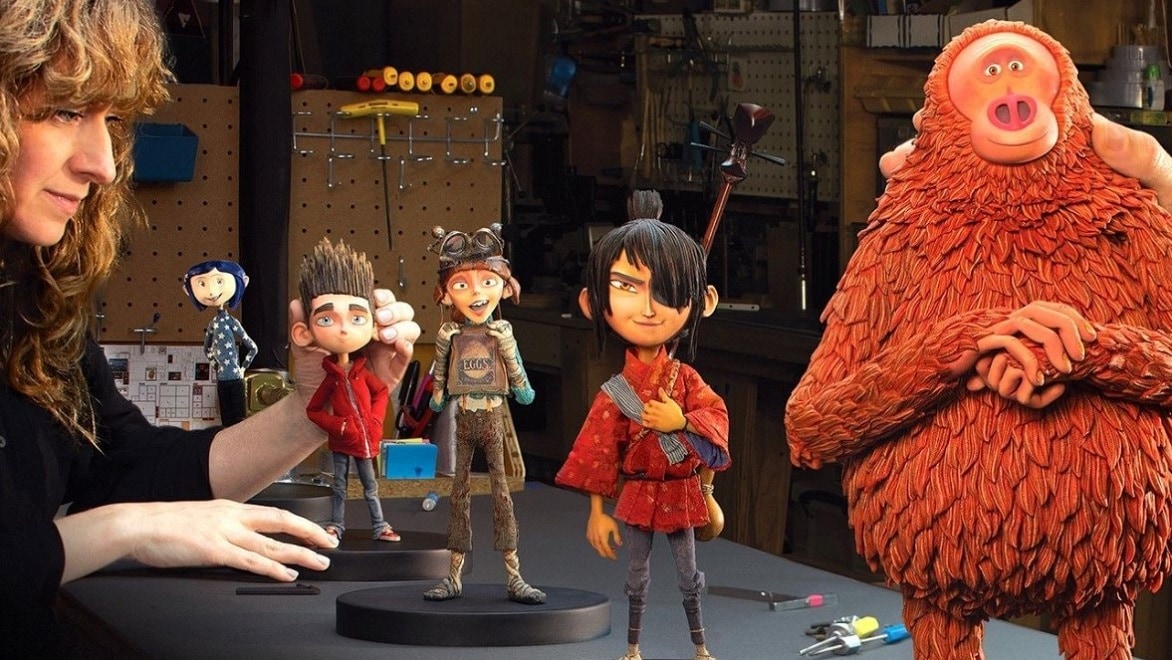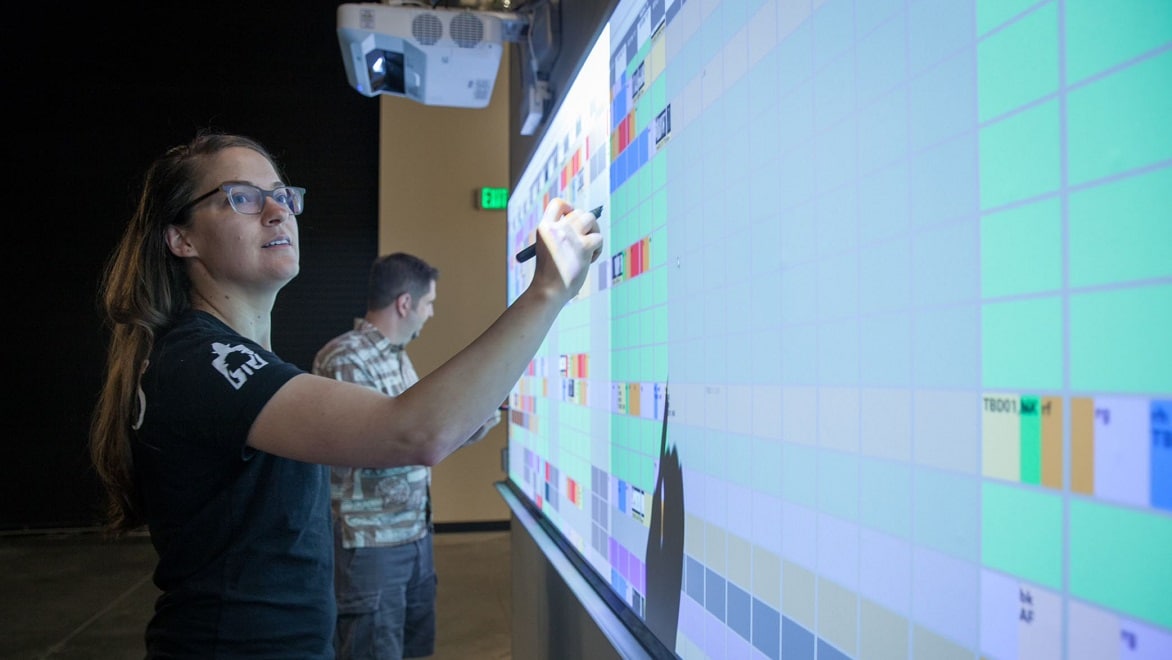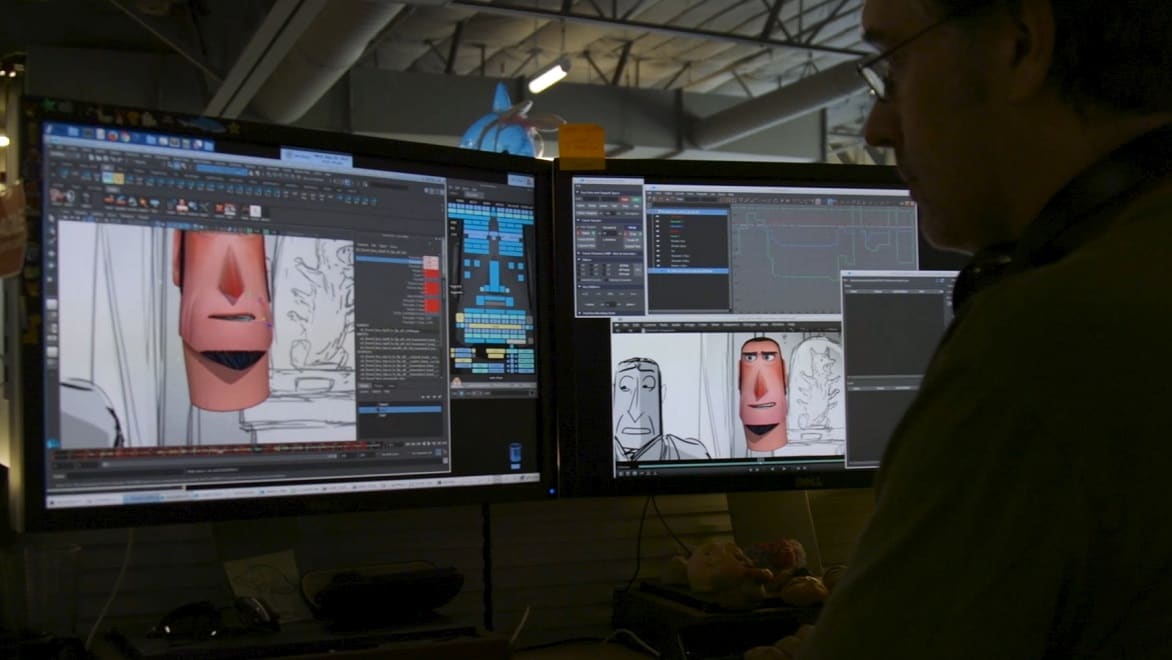LAIKA
Pushing the boundaries of animation with cloud-based production
The New Possible
Share this story
Cloud collaboration and connected data keep complex productions on track
Feature-film animation studio LAIKA relentlessly pushes the creative boundaries of stop-motion filmmaking, a unique style of animation that combines real physical sets and puppets with visual effects. Cloud-based production, using ShotGrid in a unified environment, provides the studio with powerful tools that connect data and enable effective collaboration. These capabilities break down barriers between artists, creative directors, producers, production managers, and everyone else in between, so LAIKA can create rich film experiences that wow audiences and win awards.

Artists pose puppets of the lead characters from LAIKA's stop-motion films (left to right) Coraline, ParaNorman, The Boxtrolls, Kubo and the Two Strings, and Missing Link. Image courtesy of LAIKA.
A little magic takes a lot of work
The artists of LAIKA are masters of stop-motion animation, blending physical and digital worlds to create captivating cinematic experiences. Each project is a massive undertaking, requiring the design and fabrication of thousands of sets, props, puppets, and costumes that are rigged and animated in frame-by-frame detail. A comprehensive schedule is essential to this intricate filmmaking machine—helping to allocate production resources, hire the right number of people with the right skills, prioritize work, and communicate with the team.
“It’s a magical art form, but it’s also very technical and incredibly time-consuming,” said Steve Emerson, VFX supervisor at LAIKA. “As our films have grown in complexity and scale, maintaining an accurate schedule has become more of a challenge since much of this process has been done by hand and informed by gut instinct.”

Cloud-based production using ShotGrid enables LAIKA to schedule and manage the studio's complex multiyear projects more effectively. Image courtesy of LAIKA.
An industry under pressure to deliver more, faster
Now more than ever, entertainment companies are under pressure to quickly generate new, more immersive content to feed an insatiable global audience. Entertainment consumption surged during the height of the COVID-19 pandemic—and consumers continue to spend more time gaming, listening, binge-watching, and seeking out impactful theatrical entertainment experiences.
To seize this opportunity, forward-thinking studios such as LAIKA are bridging the longstanding divide between creative and technical processes caused by disconnected data and broken workflows. A whole new world of possibilities opens up with cloud-based platform technology: “Production in the cloud is where we are heading,” said Sarah Hodges, VP, Cloud Environment and Services at Autodesk. “Fundamentally, it’s all about managing the flow of processes and unlocking efficiencies throughout the pipeline. And we can enable it at scale in the cloud.”
Managing complex projects with connected data
With every technical and artistic advance that LAIKA has made to add texture and depth to the cinematic experience comes more complexity for the production schedule—more minutiae that must be managed across teams to meet deadlines and budgets. On a recent project, managing the puppet schedule alone involved 12,000 tasks for 300 assets across 60 team members.
In the movie-making industry, schedule optimization is known as leveling. It’s a tedious but necessary process to maximize resources, minimize downtime, and evenly spread the workload. In the past, the leveling process required project management tools, Excel spreadsheets, and file exports and imports. When changes happened, manual updates across multiple data sets would ensue.
Never satisfied with the status quo, LAIKA partnered with Autodesk to push the boundaries of production schedule management.
The solution was to bring together all those disconnected data points into a single cloud-based environment, so they could be optimized. Autodesk’s production management software ShotGrid became the foundation from which LAIKA created a new workflow that combines data modeling, day-to-day task management, and machine learning. The result is an automated leveling process—an optimized schedule that would have taken a human weeks to create is now delivered in minutes.
“The first time we got a schedule back [using generative scheduling in ShotGrid] was a big ‘a-ha’ moment. Since the generated schedules are highly optimized, they don’t waste a second of anybody’s time. And they can be adjusted on the fly, accounting for different variables.”
—Steve Emerson, VFX Supervisor, LAIKA

An artist works on the design of a character for the film Missing Link. Image courtesy of LAIKA.
LAIKA unlocks more time to innovate and create
Using cloud-based production to reduce manual tasks like scheduling gives teams time back to create even richer experiences for audiences. And that’s just the start: LAIKA aims to get even more from connected data by using artificial intelligence (AI) and augmented reality (AR) to further blend the physical and digital aspects of production. The studio is exploring machine learning that recognizes rigging systems, so they can be painted out in post-production, and digital representations of sets that quickly demonstrate shot composition to the director.
As audiences demand more from their entertainment experiences, LAIKA is too. “We want to push stop-motion as far as we possibly can,” Emerson says. “How can we make it truly exceptional and visually beyond anything that audiences have ever experienced before?” The answer: make technology the enabler of artistry. By optimizing data, teams, and processes in a connected environment, LAIKA is accelerating its craft.